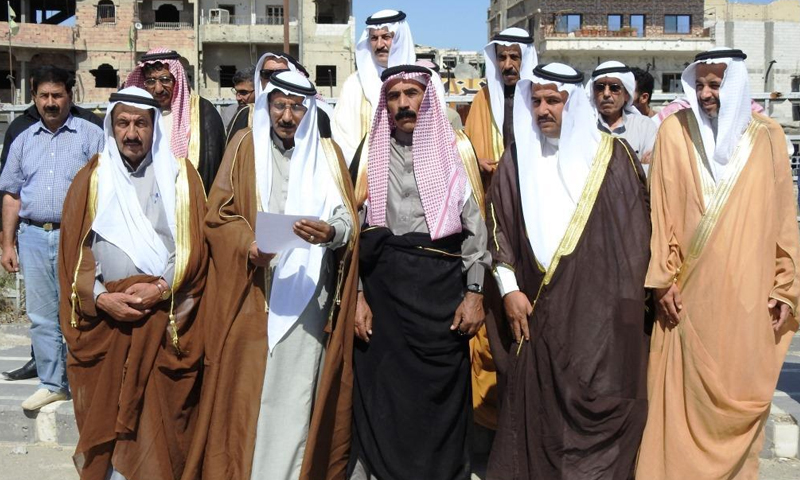



Raqqa – Hussam al-Omar
Several civil activists have launched a campaign dubbed “I Am from the Tribe of Raqqa” in an effort to end growing tensions and tribalism that follow every quarrel occurring in the city, the founder of the campaign, who spoke on the condition of anonymity, told Enab Baladi.
The civil activist said that the persistence of tribalism and clanism among some Raqqa residents is “dangerous” and must be well considered.
The most recent tragic incident of infighting occurred on 24 April in the city of Raqqa between members of al-Sakhani and al-Bu Saraya clan members, which led to the death and injury of several people.
According to eyewitnesses, the dispute began when one of the Raqqa residents got furious by leaving a car in front of his store in the street of Tell Abyad, the main market in the city.
According to the civil activist, many clans and tribes no longer adhere to tribal law and traditional customs “strictly” in Raqqa.
The activist explained that some people overreact to some situations with “angry bursts,” sparking infighting and tensions in the area.
Dozens of Arab tribes and clans live in the city of Raqqa. However, most of them have shifted their loyalties from tribes to localities, known as a civil society since the 1950s.
During the last 50 years, Raqqa has seen a series of migrations from the rural areas of Aleppo, Idlib, Deir Ezzor, and Homs (mainly from al-Sukhnah and Palmyra). This has greatly changed a lot of the cultural traditions of Raqqa residents. Only particular tribal customs and traditions were preserved, such as reconciliation processes, funerals, and wedding ceremonies.
The majority of clans and tribes in Syria did not take a unified stand on the Syrian uprising. In fact, the bodies that ruled the region attempted to win over tribes and clans, giving them some influence and powers at times or intimidating their figures and elders at other times.
One of the elders of the Afadala tribe, the largest tribe in Raqqa, told Enab Baladi that before the eruption of the Syrian revolution, the Syrian regime was following a policy in dealing with the tribes, which is based on banishing national or influential figures in tribes and clans, and appointing “spineless and unwanted” personalities instead. The Syrian regime, via this policy, sought to create divisions amongst the clans and tribes.
The Afadala tribal elder, who declined to be named for security considerations, also said that there was no tribalism or clanism in Raqqa over the past years because of the inter-clan marriages. Most clans and tribes integrate and mix with each other.
After the Islamic State (IS) wrested control of Raqqa in 2014, it formed “the Diwan [bureau] of the Tribes,” which was intended to win the people of the region over. However, the IS’s influence remained limited because it would focus on disseminating and imposing religious beliefs and practices that undermine the tribal community.
However, when the Syrian Democratic Forces (SDF) and the Autonomous Administration established control over Raqqa, they tried to cozy up to the Arab tribes by granting some elders certain privileges within the civil and military institutions.
The administration also formed “a public relations office,” in which it employed sheiks and notables from Raqqa tribes, “with the aim of glorifying the SDF and making them look like the legitimate and national forces that represent all Syrians,” according to the Afadala tribal elder.
In addition, the administration appointed tribal figures to high-level positions within its civil institutions, such as the presidency of the Civil Council of Raqqa. The council, for example, is headed by Muhammad Nour al-Theeb, one of the elders of al-Afadala tribe. In another example, Hamad al-Faraj, an elder from the al-Walidah clan, was assigned as the head of the Legislative Council in Tabqa.
Many tribes and clans have maintained the existence of “the tribe’s diwan,” which is often in the house of the tribal sheikh or one of its notables. Diwan is a tribal guesthouse, locally known as madafa, where tribal members and elders meet.
Enab Baladi conducted an opinion poll among young people of tribes and clans in Raqqa. They said that some quarrels are developing rapidly to intra-clan fighting due to the nature of the people of the region, noting that reconciliations are taking place quickly as well.
The young men believe that tribalism and clanism have become a thing of the past. Yet, they resurge with every quarrel that occurs between members of the tribes.
On 26 March 2021, 18 clans and tribes signed a letter containing “disciplinary measures” to resolve disagreements and disputes in the Syrian Jazira region. The disciplinary measures will be used to solve problems resulting from practices that harm the interests and relations of society, such as theft, looting, and banditry, in addition to revenge killings and blood money that may follow.
if you think the article contain wrong information or you have additional details Send Correction